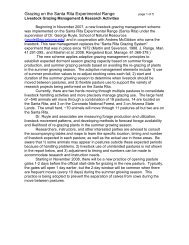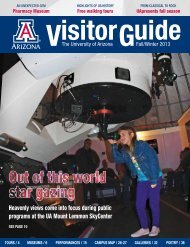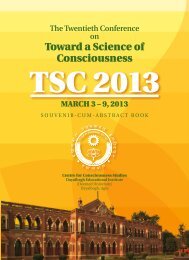CONSCIOUSNESS
Download - Center for Consciousness Studies - University of Arizona
Download - Center for Consciousness Studies - University of Arizona
- No tags were found...
You also want an ePaper? Increase the reach of your titles
YUMPU automatically turns print PDFs into web optimized ePapers that Google loves.
74 1. Philosophy<br />
are wrong simpliciter. But it would be better if the error theorist could modify their account to<br />
show how certain color sentences can be true while still holding that the folk are wrong about<br />
color. I’ll argue that Boghossian and Velleman’s projective error theory offers up no acceptable<br />
way to understand what is going on in color talk, and propose my own theory. My main<br />
objection is that they base their semantics on pragmatic value, eliminating reference to truth<br />
in color sentences, but that there are sentences involving colors that are true. I’ll then offer<br />
my own proposal. I’ll show that object representations are necessarily colored, but that colors<br />
don’t track objects the same way object representations do. From this, it follows that colors<br />
aren’t represented as intrinsic properties (though phenomenology presents them as intrinsic).<br />
I’ll argue that this gives us motivation to adopt an adverbial theory of color representation:<br />
objects are represented color-ly. This is deeply connected to Fregean strategies for perceptual<br />
content, such as that advocated by David Chalmers and Brad Thompson. I’ll develop an adverbial<br />
theory within the framework of the Fregean theory of perceptual content, and then I’ll<br />
answer objections, one involving inverted spectra and the other involving the veridicality of<br />
color representations. P7<br />
69 Consciousness, Access and Phenomenal Overflow: A Reply to Block T. Bradley<br />
Richards (Philosophy, University of Guelph, Toronto, Ontario<br />
Canada)<br />
Ned Block claims that phenomenology “overflows” cognitive accessibility, that the capacity<br />
of phenomenal experience is greater than the capacity of the “global workspace”, and thus,<br />
that there are conscious experiences that are inaccessible. He thinks overflow is the best explanation<br />
of certain experimental results (especially from Sperling (1960) and Landman et.al.,<br />
(2003).I have followed various critics, and Block himself, in insisting that phenomenal overflow<br />
is only a good explanation of the experimental results if the subjects in these experiments<br />
have specific (as opposed to generic) phenomenal contents of the relevant kind for all or most<br />
of the items presented prior to the cue. Block must distinguish between two kinds of access in<br />
order for his view to be intelligible, but he cannot use subjects’ reports as evidence of specific<br />
phenomenology in the phenomenal overflow experiments: this would require subjects to both<br />
have and not have *cognitive access* to a content C at t. This leaves Block with only neural<br />
evidence, and at least current neural evidence does not support the claim that subjects have<br />
specific phenomenology of the relevant kind. Given that there is no evidence that the subjects<br />
have specific phenomenology, phenomenal overflow is not even a good explanation of the<br />
experimental results. While these considerations do not show that there are no inaccessible<br />
phenomenal states, they do show that we have no reason to posit them. Further, if there were<br />
inaccessible phenomenal states, it would be impossible to specify phenomenal contents of<br />
any kind. Thus, if phenomenal contents or the theories that employ them are of any value, we<br />
have a reason not to posit inaccessible phenomenal contents. Finally, I speculate that Block’s<br />
original claim that phenomenology overflows accessibility would be vindicated if there was<br />
contentless phenomenal experience. This would account for our intuition that infants and certain<br />
kinds of animals can be conscious despite lacking the capacity for certain kinds of higher<br />
order thought, and broadcasting to the global workspace (and a global workspace). It would<br />
also account for correlates of phenomenal consciousness that are not broadcast, if there are<br />
any, without requiring inaccessible phenomenal contents. P7<br />
70 Theory of Consciousness and the Self. What was in the Mind of Marx, Freud and<br />
Einstein When They Conceived Their Respective Theories? Juan Tomas Rodriguez-<br />
Colon (San Juan, PR)<br />
The German philosopher, Wilhelm Gottfried Leibniz, stated that in a logical and truthful<br />
proposition the content or nature of the predicate (consciousness) must be derived from the<br />
nature of the subject. The proposed theory defines what constitutes the individuality of any<br />
person, explaining thus the nature of the predicate or behavior in terms of the subject as it was<br />
conceived by Leibniz. According to us, the essence of that individuality is based on a new<br />
conception regarding the proper group of names, their etymologies, and archetypes implicit in<br />
the constitution and development of the conscious personality. The theory establishes the idea







